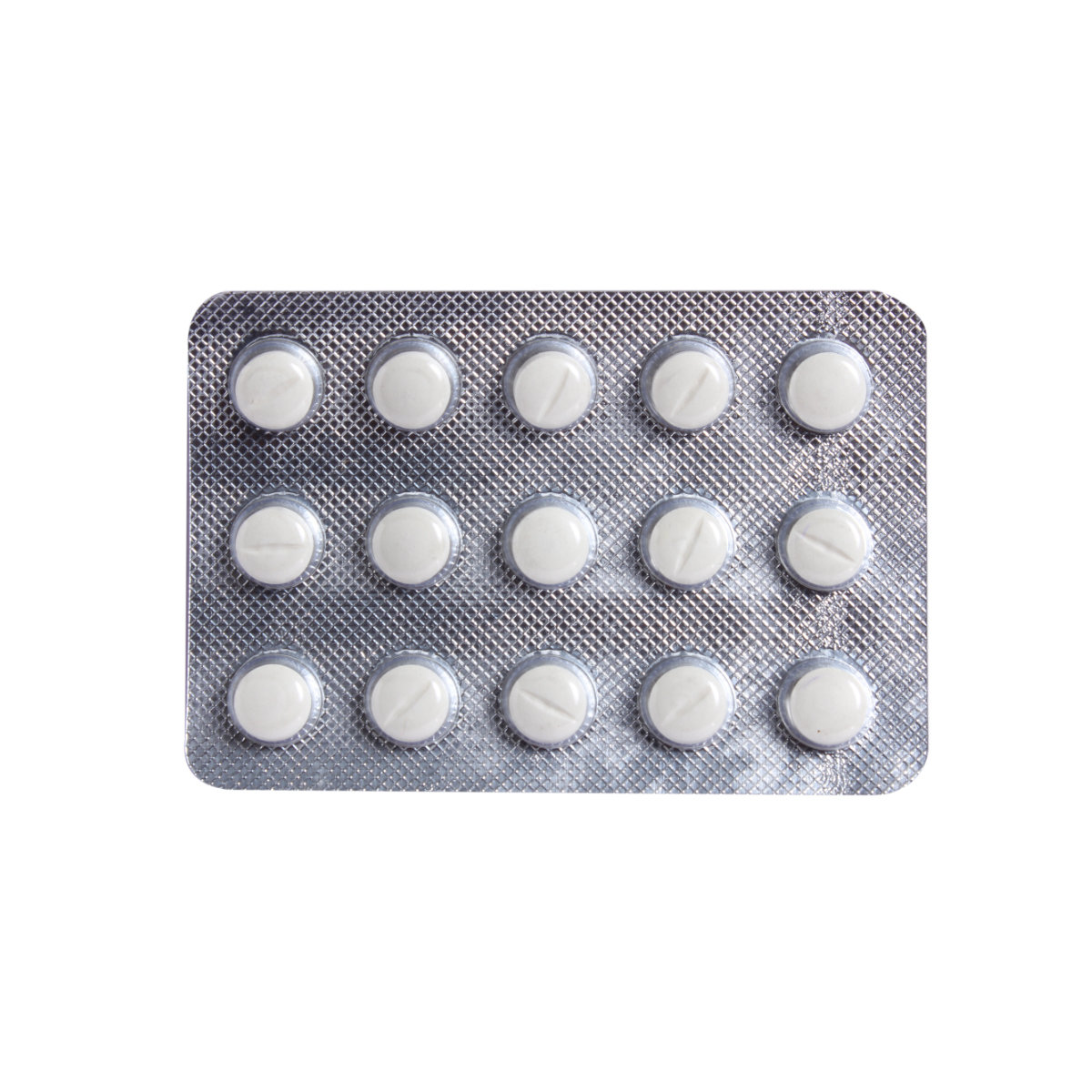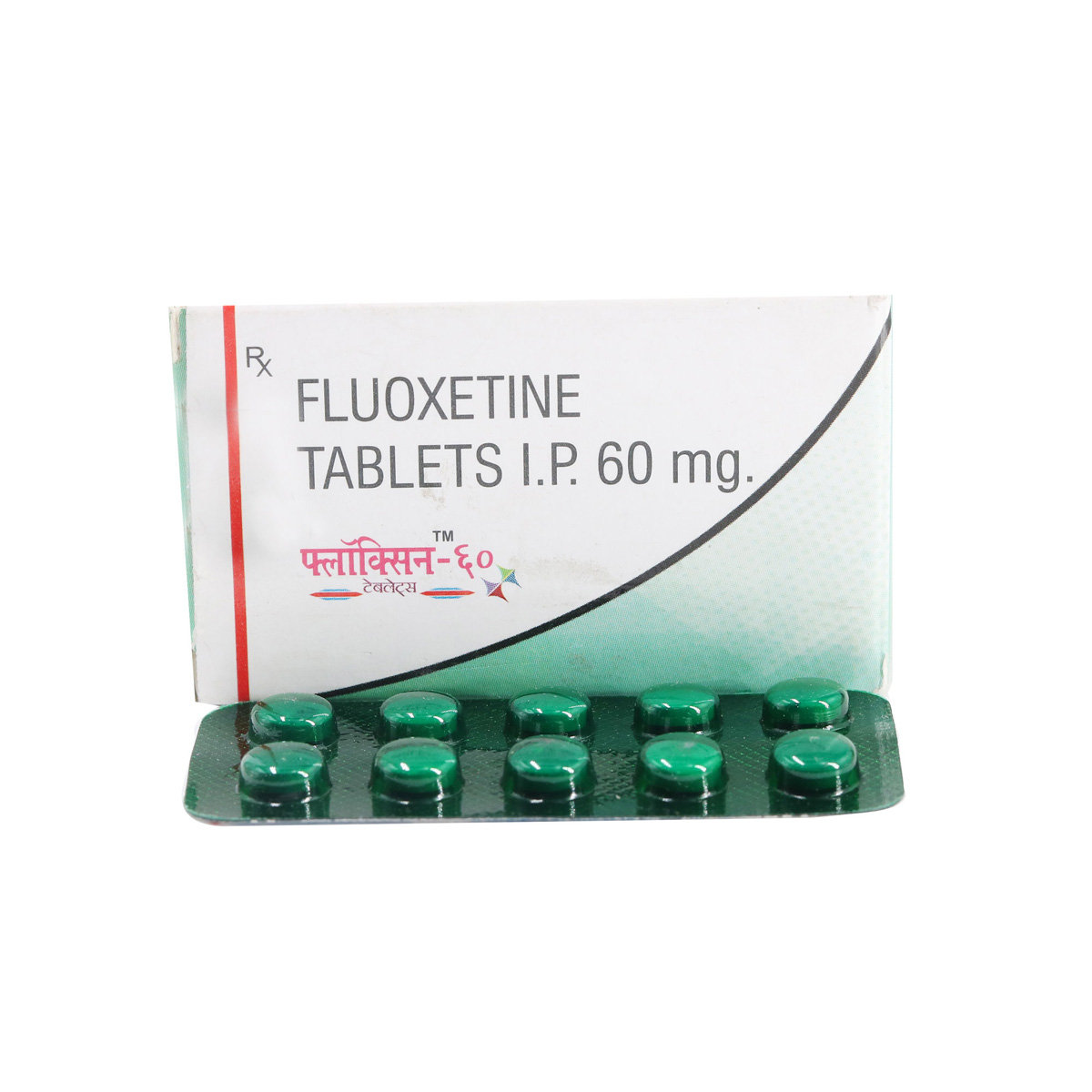FLUOXET 60MG TABLET
MRP ₹88
(Inclusive of all Taxes)
₹13.2 Cashback (15%)
Provide Delivery Location
Online payment accepted
 Prescription drug
Prescription drugWhats That
Composition :
Manufacturer/Marketer :
Consume Type :
Expires on or after :
Return Policy :
NPPA :
About FLUOXET 60MG TABLET
FLUOXET 60MG TABLET belongs to a group of medicines called antidepressants used to treat a major depressive disorder, obsessive-compulsive disorder (OCD), bulimia nervosa (eating disorder), and panic disorder. Depression is a mood disorder characterised by the feeling of sadness, unhappiness, anger, hopelessness or loss that interferes with a person’s daily activities.
FLUOXET 60MG TABLET contains ‘Fluoxetine’ which is a selective serotonin reuptake inhibitor. It works by inhibiting the reuptake of serotonin by nerves, a mood-enhancing chemical messenger in the brain which communicates between brain cells. This helps in an increase in serotonin concentrations in the nerve synapse, thereby helps in regulating mood and treats depression.
Take FLUOXET 60MG TABLET as prescribed. You are advised to take FLUOXET 60MG TABLET for as long as your doctor has prescribed it for you depending on your medical condition and response to the treatment. In some cases, you may experience certain common side-effects such as insomnia (difficulty sleeping), headache, diarrhoea, nausea, fatigue, dry mouth, loss of appetite, and indigestion. Most of these side-effects do not require medical attention and will resolve gradually over time. However, you are advised to talk to your doctor if you experience these side-effects persistently.
Please do not stop taking FLUOXET 60MG TABLET on your own as it could lead to withdrawal symptoms. Do not take FLUOXET 60MG TABLET if you are pregnant or breastfeeding unless prescribed. Do not drive or operate machinery as FLUOXET 60MG TABLET may cause dizziness and might impair your reactions. FLUOXET 60MG TABLET should not be given to children below 8years as the safety and effectiveness have not been established. Avoid consuming alcohol along with FLUOXET 60MG TABLET as it could lead to increased dizziness. Keep your doctor informed about your health condition and medicines to rule out any side-effects.
Uses of FLUOXET 60MG TABLET
Directions for Use
Key Benefits
FLUOXET 60MG TABLET belongs to a group of antidepressant medicines called selective serotonin reuptake inhibitors. FLUOXET 60MG TABLET is used to treat major depressive disorder, obsessive-compulsive disorder (OCD), bulimia nervosa (eating disorder), and panic disorder with or without agoraphobia. FLUOXET 60MG TABLET works by inhibiting the reuptake of serotonin by nerves, a mood-enhancing chemical messenger in the brain which communicates between brain cells. This helps in an increase in serotonin concentrations in the nerve synapse, thereby helps in regulating mood and treats depression. FLUOXET 60MG TABLET may also be used to treat premenstrual dysphoric disorder (a severe form of premenstrual syndrome). FLUOXET 60MG TABLET has fewer unwanted effects than other antidepressant drugs. FLUOXET 60MG TABLET is used in combination with other drugs to treat bipolar disorder and treatment-resistant depression.
Storage
- Hydrate your body: Drink enough water to prevent dehydration and headaches.
- Calm Your Mind: Deep breathing and meditation can help you relax and relieve stress.
- Rest and Recharge: Sleep for 7-8 hours to reduce headache triggers.
- Take rest: lie down in a quiet, dark environment.
- Cold or warm compresses can help reduce tension.
- Stay Upright: Maintain good posture to keep symptoms from getting worse.
- To treat headaches naturally, try acupuncture or massage therapy.
- Over-the-counter pain relievers include acetaminophen and ibuprofen.
- Prescription Assistance: Speak with your doctor about more substantial drug alternatives.
- Severe Headaches: Seek emergency medical assistance for sudden, severe headaches.
- Frequent Headaches: If you get reoccurring headaches, consult your doctor.
- Headaches with Symptoms: Seek medical attention if your headaches include fever, disorientation, or weakness.
- Inform your doctor about the nausea and discuss possible alternatives to the medication or adjustments to the dosage.
- Divide your daily food intake into smaller, more frequent meals to reduce nausea.
- Opt for bland, easily digestible foods like crackers, toast, plain rice, bananas, and applesauce.
- Avoid certain foods that can trigger nausea, such as fatty, greasy, spicy, and smelly foods.
- Drink plenty of fluids, such as water, clear broth, or electrolyte-rich beverages like coconut water or sports drinks.
- Use ginger (tea, ale, or candies) to help relieve nausea.
- Get adequate rest and also avoid strenuous activities that can worsen nausea.
- Talk to your doctor about taking anti-nausea medication if your nausea is severe.
- Record when your nausea occurs, what triggers it, and what provides relief to help you identify patterns and manage your symptoms more effectively.
- Prepare for a restful night's sleep: Develop a calming pre-sleep routine, like reading or meditation, to help your body relax and prepare for sleep.
- Create a sleep-conducive Environment: Make bedroom a sleep haven by ensuring it is quiet, dark and calm.
- Follow a Sleep Schedule: Go to bed and get up at the same time every day to help regulate your body's internal clock and increase sleep quality.
- Try relaxing techniques like deep breathing, mindfulness meditation and any others.
- Limit stimulating activities before bedtime: Avoid stimulating activities before bedtime to improve sleep quality.
- Monitor Progress: Keep track of your sleep patterns to identify areas for improvement.
- Consult a doctor if needed: If these steps don't improve your sleep, consult a doctor for further guidance and therapy.
- Inform your doctor about your anxiety symptoms so that you doctor may explore potential drug interactions and alter your treatment plan.
- Work with your doctor to adjust your medication regimen or dosage to minimize anxiety symptoms.
- Reduce anxiety symptoms by practicing relaxation techniques like meditation, deep breathing, or yoga.
- Regular self-care activities, such as exercise, healthy food, and adequate sleep, can assist control anxiety.
- Surround yourself with a supportive network of friends, family, or a support group to help manage anxiety and stay motivated.
- Regularly track anxiety symptoms and report any changes to your doctor to ensure your treatment plan is effective and adjusted as needed.
- Rest well; get enough sleep.
- Eat a balanced diet and drink enough water.
- Manage stress with yoga and meditation.
- Limit alcohol and caffeine.
- Physical activities like walking or jogging might help boost energy and make you feel less tired.
- Inform Your Doctor: Notify your doctor immediately about your diarrhoea symptoms. This allows them to adjust your medication or provide guidance on managing side effects.
- Stay Hydrated: Drink plenty of fluids to replace lost water and electrolytes. Choose water, clear broth, and electrolyte-rich drinks. Avoid carbonated or caffeinated beverages to effectively rehydrate your body.
- Follow a Bland Diet: Eat easy-to-digest foods to help firm up your stool and settle your stomach. Try incorporating bananas, rice, applesauce, toast, plain crackers, and boiled vegetables into your diet.
- Avoid Trigger Foods: Steer clear of foods that can worsen diarrhoea, such as spicy, fatty, or greasy foods, high-fibre foods, and dairy products (especially if you're lactose intolerant).
- Practice Good Hygiene: Maintain good hygiene to prevent the spread of infection. To stay healthy, wash your hands frequently, clean and disinfect surfaces regularly, and avoid exchanging personal belongings with others.
- Take Anti-Diarrheal Medications: If your doctor advises, anti-diarrheal medications such as loperamide might help manage diarrhoea symptoms. Always follow your doctor's directions.
- Keep track of your diarrhoea symptoms. If they don't get better or worse or are accompanied by severe stomach pain, blood, or dehydration signs (like extreme thirst or dark urine), seek medical help.
- Tell your doctor immediately if you experience symptoms of Nervousness, such as anxiety, jitteriness, or an increased heart rate, after taking medication or adjusting your medication regimen.
- Your doctor may adjust your medication regimen to alleviate symptoms of Nervousness. This can include switching to a different medication, reducing the dosage, or temporarily stopping the medication. Your doctor may also recommend alternative techniques like relaxation, mindfulness meditation, or journaling. These techniques can help reduce anxiety and Nervousness.
- Practice stress-reducing techniques, such as deep breathing exercises, yoga, or journaling, to help manage Nervousness.
- Engage in regular physical activity, such as walking or jogging, to help reduce anxiety and improve mood.
- Your doctor may advise considering cognitive-behavioural therapy (CBT) or other forms of talk therapy to address underlying anxiety or Nervousness.
- You should maintain regular follow-up appointments with your doctor to monitor nervousness symptoms, adjust treatment plans as needed, and discuss any concerns or questions.
Drug Warnings
Do not take FLUOXET 60MG TABLET if you are allergic to any of its contents; if you are taking monoamine oxidase inhibitors (MOA) or have taken them in the last 14days, or if you are taking metoprolol (used to treat high blood pressure). Do not take FLUOXET 60MG TABLET along with opioid antagonists such as buprenorphine and naloxone as it might lead to a serious condition called serotonin syndrome. Consult your doctor immediately if you have suicidal thoughts such as killing or harming yourself. Inform your doctor if you have/had epilepsy, mania, glaucoma, diabetes, bleeding disorders, or hyponatremia (low sodium levels). Do not take FLUOXET 60MG TABLET if you are pregnant or breastfeeding unless prescribed. Do not drive or operate machinery as FLUOXET 60MG TABLET may cause dizziness and might impair your reactions. FLUOXET 60MG TABLET should not be given to children below 8years as the safety and effectiveness have not been established. Avoid consuming alcohol along with FLUOXET 60MG TABLET as it could lead to increased dizziness.
Drug-Drug Interactions
Drug-Drug Interactions
Login/Sign Up
Taking Fluoxet 60mg Tablet with dronedarone may increase the risk of an irregular heart rhythm that may be serious.
How to manage the interaction:
Although there is a possible interaction, Fluoxet 60mg Tablet can be taken with dronedarone if prescribed by the doctor. Consult the doctor if you develop sudden dizziness, lightheadedness, fainting, shortness of breath, or heart palpitations during treatment with either of these medications.
Co-administration of Lithium with Fluoxet 60mg Tablet can result in effects and also Serotonin syndrome (a condition wherein serotonin levels are increased in the body).
How to manage the interaction:
Although there is a interaction between Fluoxet 60mg Tablet and Lithium, but can be taken together if prescribed by a doctor. However, consult a doctor if you experience confusion, hallucination(seeing and hearing things that do not exist), fits, blood pressure alteration, increased heart rate, fever, excessive sweating, shivering or shaking, blurred vision, pain in the muscles or stiffness, incoordination, stomach cramps, nausea, vomiting, and loose stools. Do not discontinue any medications without consulting a doctor.
When Brexpiprazole is taken with Fluoxet 60mg Tablet, the amount of Brexpiprazole in the blood can go up.
How to manage the interaction:
Although taking Fluoxet 60mg Tablet and Brexpiprazole together can evidently cause an interaction, it can be taken if a doctor has suggested it. Do not stop using any medications without a doctor's advice.
Taking Fluoxet 60mg Tablet with tramadol may increase the risk of a serotonin syndrome. It may also increase the risk of seizures not related to the serotonin syndrome.
How to manage the interaction:
Although there is a possible interaction, Fluoxet 60mg Tablet can be taken with tramadol if prescribed by the doctor. Consult the doctor if you experience symptoms of serotonin syndrome such as confusion, hallucination, seizure, extreme changes in blood pressure, increased heart rate, fever, excessive sweating, shivering or shaking, blurred vision, muscle spasm or stiffness, tremor, incoordination, stomach cramp, nausea, vomiting, and diarrhea. Do not discontinue the medications without consulting a doctor.
Co-administration of Escitalopram with Fluoxet 60mg Tablet may increase the risk of serotonin syndrome (a condition wherein serotonin levels are increased in the body).
How to manage the interaction:
Although there is an interaction between Fluoxet 60mg Tablet and escitalopram, they can be taken together if prescribed by a doctor. However, consult a doctor if you experience confusion, hallucinations (seeing and hearing things that do not exist), increased heart rate, fever, excessive sweating, shivering or shaking, blurred vision, pain in the muscles or stiffness, incoordination, stomach cramps, nausea, vomiting, and diarrhea. Do not discontinue any medications without consulting your doctor.
When Desipramine is taken with Fluoxet 60mg Tablet, the amount of Desipramine in the blood can go up.
How to manage the interaction:
Co-administration of Fluoxet 60mg Tablet with Desipramine can possibly result in an interaction, but it can be taken if a doctor has advised it. If you notice any of these symptoms - feeling sleepy, having a dry mouth, trouble seeing clearly, difficulty going to the bathroom, feeling confused or having hallucinations, having a seizure, a fast heartbeat, a fever, sweating a lot, shivering or shaking, muscle spasms or stiffness, trouble moving, stomach cramps, feeling sick or throwing up, or having diarrhea - make sure to call a doctor right away. Do not stop using any medications without a doctor's advice.
When Vilazodone is taken with Fluoxet 60mg Tablet, may increase the risk of serotonin syndrome (a condition in which a chemical called serotonin increases in your body).
How to manage the interaction:
Although there is a possible interaction, Fluoxet 60mg Tablet can be taken with Vilazodone if prescribed by the doctor. Consult the doctor if you experience symptoms of serotonin syndrome such as confusion, hallucination, seizure, extreme changes in blood pressure, increased heart rate, fever, excessive sweating, shivering or shaking, blurred vision, muscle spasm or stiffness, tremor, incoordination, stomach cramp, nausea, vomiting, and diarrhea. Do not discontinue the medications without consulting a doctor.
Taking Fluoxet 60mg Tablet with disopyramide may increase the risk of an irregular heart rhythm that may be serious.
How to manage the interaction:
Although there is a possible interaction, Fluoxet 60mg Tablet can be taken with disopyramide if prescribed by the doctor. Consult the doctor if you experience sudden dizziness, lightheadedness, fainting, shortness of breath, or heart palpitations during treatment with these medications.
Taking Fluoxet 60mg Tablet may significantly increase the blood levels of atomoxetine. This might increase the side effects.
How to manage the interaction:
Although there is a possible interaction, Fluoxet 60mg Tablet can be taken with atomoxetine if prescribed by the doctor. Consult the doctor if you experience side effects such as dizziness, dry mouth, loss of appetite, sleep disturbances, and heart palpitations. Do not discontinue any medications without a doctor's advice.
Co-administration of Fluoxet 60mg Tablet may increase the blood levels and effects of Vortioxetine.
How to manage the interaction:
Although there is a possible interaction between Fluoxet 60mg Tablet and Vortioxetine, you can take these medicines together if prescribed by a doctor. If you experience any of these symptoms - confusion, hallucination, seizure, extreme changes in blood pressure, increased heart rate, fever, excessive sweating, shivering or shaking, blurred vision, muscle spasm or stiffness, tremor, incoordination, stomach cramp, nausea, vomiting, and diarrhea. make sure to call a doctor right away. Do not stop using any medications without talking to a doctor.
Drug-Food Interactions
Drug-Food Interactions
Login/Sign Up
Diet & Lifestyle Advise
- Maintain a healthy diet and exercise regularly helps in improving overall health and boosts self-esteem.
- Regularly attend therapy sessions.
- Perform meditation and yoga. This helps in relieving stress and provides relaxation.
- Follow a regular sleep pattern to improve the amount and quality of sleep you get.
- Include foods rich in omega fatty acids such as fish, nuts, fresh fruits, vegetables and olive oils.
- Neurotransmitters are made up of amino acids. Amino acid-rich foods such as meat, dairy products, and certain fruits and vegetables help in the proper maintenance of neurotransmitters.
- Complex carbohydrates help in stimulating serotonin (a feel-good neurotransmitter). These include whole grains, legumes, spinach, broccoli, oranges and pears.
- Exercising helps in the production of the body’s natural antidepressants. It also helps in relieving stress, improving mood, boosts self-esteem, and provides restful sleep.
- Avoid smoking and alcohol consumption.
- Learn about your condition, understand the risk factors and follow the doctor’s treatment plan.
Side Effects of FLUOXET 60MG TABLET
- Insomnia (difficulty sleeping)
- Headache
- Diarrhoea
- Nausea
- Fatigue
- Dry mouth
- Loss of appetite
- Indigestion
Habit Forming
Therapeutic Class
All Substitutes & Brand Comparisons
RX
Out of StockFluchem 60mg Tablet
Chemo Biological Ltd
₹58
(₹5.22 per unit)
34% CHEAPERRX
Tritin 60 mg Tablet 10's
Tripada Healthcare Pvt Ltd
₹85.5
(₹7.7 per unit)
2% CHEAPERRX
Beteala 60 mg Tablet 10's
Cnx Health Care Pvt Ltd
₹86
(₹7.74 per unit)
2% CHEAPER
Author Details
We provide you with authentic, trustworthy and relevant information
Drug-Diseases Interactions
Drug-Diseases Interactions
Login/Sign Up
FAQs
Drug-Drug Interactions Checker List
- METOPROLOL
- NEBIVOLOL
- BUPRENORPHINE
- NALOXONE
- LINEZOLID
- PIMOZIDE
- THIORIDAZINE
- LITHIUM
- RISPERIDONE
- METHYLENE BLUE
- BUPROPION
- PROPAFENONE
- FLECAINIDE
- ATOMOXETINE
- DESMOPRESSIN
- MEFLOQUINE
- CHLOROQUINE
- MEQUITAZINE
- CYPROHEPTADINE
- OXCARBAZEPINE
- CARBAMAZEPINE
- PHENYTOIN
- SELEGILINE
- TRAMADOL
- IBUPROFEN
- ASPIRIN
- SUMATRIPTAN
- WARFARIN
- TAMOXIFEN
Disease/Condition Glossary
Major depressive disorder: Major depressive disorder, also known as clinical depression, is a mental health disorder characterised by a persistent and intense feeling of sadness for an extended duration of time. It mainly impacts mood, behaviour, and other physical functions, such as sleep and appetite. Symptoms include sadness, loss of interest, changes in appetite, sleep problems, restlessness, lack of energy, feeling worthless or guilty, thoughts of harming oneself, difficulty in concentrating, making decisions, and thinking. The exact cause of depression is unknown. However, factors such as stress, changes in hormone levels, alcohol or drug abuse, abuse during childhood, certain medical conditions and medications might increase the risk of developing depression.
Obsessive-Compulsive Disorder (OCD): It is a mental disorder which is associated with repetitive thoughts (obsessions) and the urge to do things over and again (compulsions).
Bulimia nervosa: It is a serious eating disorder which is characterised by binge eating followed by methods to avoid overweight such as vomiting, severe exercise or fasting.
Panic disorder: It is a type of anxiety disorder which causes panic attacks. In this condition, a person experiences a sudden feeling of fear, when, in reality, there is no danger. Symptoms include fast heartbeat, breathing difficulty, chest or stomach pain, weakness or dizziness, and sweating.

Have a query?
Alcohol
Safe if prescribed
Avoid consumption of alcohol while taking FLUOXET 60MG TABLET as it may cause increased dizziness.
Pregnancy
Consult your doctor
FLUOXET 60MG TABLET belongs to pregnancy category C. Please consult your doctor before taking FLUOXET 60MG TABLET if you are pregnant, your doctor will prescribe only if the benefits outweigh the risks.
Breast Feeding
Consult your doctor
FLUOXET 60MG TABLET may pass into breastmilk. Consult your doctor before taking FLUOXET 60MG TABLET; your doctor will decide whether FLUOXET 60MG TABLET can be taken by breastfeeding mothers or not.
Driving
Safe if prescribed
FLUOXET 60MG TABLET may cause dizziness and might impair your reactions. Do not drive or operate machinery if you experience these symptoms.
Liver
Consult your doctor
Dose adjustment may be needed in patients with liver impairment. Please consult your doctor if you have a liver impairment or any concerns regarding this.
Kidney
Consult your doctor
Dose adjustment may be needed in patients with kidney impairment. Please consult your doctor if you have kidney impairment or any concerns regarding this.
Children
Safe if prescribed
FLUOXET 60MG TABLET should not be given to children below 8years as the safety and effectiveness have not been established.











_0.jpg?tr=q-85)

